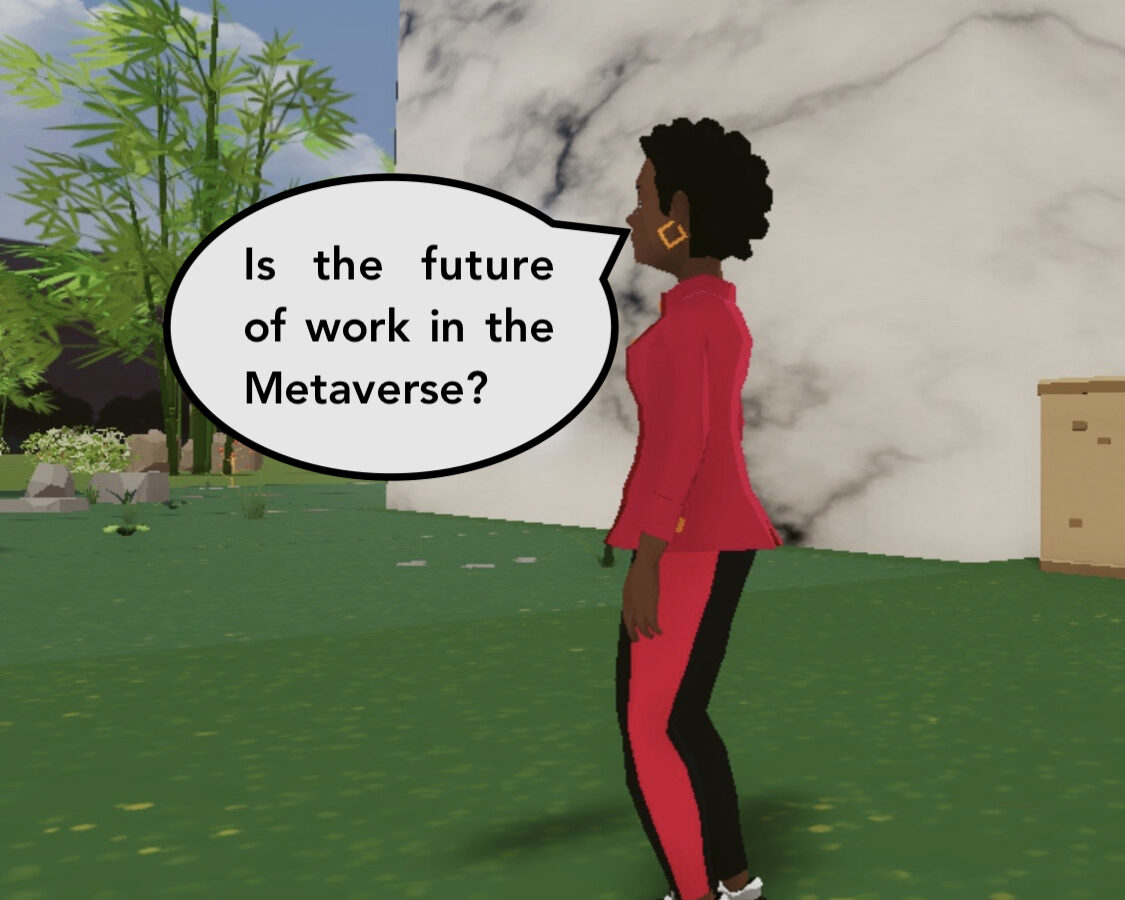My interest in the Metaverse and employment law stemmed from me going down what those in the Web3 world call, “the rabbit hole.” I began researching non-fungible tokens (“NFTs”). That research led me down the path of learning about the Metaverse.
What was this brand-new world that came with a dictionary of new words and never before imagined possibilities for human interactions? Blockchain, NFTs, cryptocurrency, smart contacts, the list goes on.
Going down the rabbit hole, I absorbed all of the information that I could take in, and I eventually ended up walking the beautiful virtual streets of the Decentraland Metaverse to see this brand new world for myself. I awkwardly stood beside strangers in this virtual world, wondering, “what is this place? Is it the Twilight Zone?”
The Metaverse has several definitions, depending on who you ask. Oxford defines the Metaverse as “a virtual-reality space in which users can interact with a computer-generated environment and other users.”
Forbes contributor and globally recognized Metaverse executive, Cathy Hackle, asked several professionals to define the Metaverse, and here are some of the definitions they provided:
Eric Redmond (Global Director, Technology Innovation, Nike)
“My general description: The Metaverse crosses the physical/digital divide between actual and virtual realities.”
Richard Ward (Global lead Enterprise VR at McKinsey)
“We are already in the Metaverse, it’s just mostly 1D (text apps, clubhouse), 2D (Zoom, shared productivity apps like Google Sheets), 2.5D (games like Fortnite, Virbela) – 3D (VR/AR) is just in the development stages.”
Tom Allen (Founder of The AI Journal)
“An exponentially growing virtual universe where people can create their own world how they see fit adapting experiences and knowledge from the physical world.”
I think of the Metaverse as the next version of the internet, where you can interact with people from around the globe in real time and experience a virtual world together in real time. You will commonly hear the term “Web3” in discussions about the Metaverse. This term describes the next frontier of the internet. The concept of the Metaverse will inevitably have countless iterations over the next several years. We are at the ground floor of a technology that will evolve with our culture, societal norms, and the practicalities of our personal and professional lives.
The possibilities for innovation and human connection that exist in the Metaverse are endless.
When I began the deep-dive into learning about the Metaverse, naturally, as an employment lawyer, I began thinking about the future of work in the Metaverse. The Metaverse fascinated me because of the new human interactions that will inevitably take place there, interactions that can be both positive for workplaces that exist in the Metaverse but fraught with legal risks if employers do not take the appropriate actions to mitigate those risks.
The definition of the “workplace” has changed dramatically in the past two years. The work from anywhere (“WFA”) culture has taken form, and there’s no turning back. Within the next several years, working from anywhere will include working in the Metaverse. Toyota has already created virtual workspaces to host employee meetings in the Metaverse. Companies considering bringing their employees to the new ” virtual workplace” in Web3 should not wait to think about the new challenges and opportunities that Web3 presents. Wage and hour concerns, harassment and discrimination issues, data preservation obligations, and workplace privacy challenges exist in physical workplaces, but these matters will also exist in Web3 workplaces.
Web3 and the Metaverse give us the ability to both work from where we are comfortable, integrating work/life balance, while also giving us the opportunity to build greater connections with our colleagues. Colleagues working together in the Metaverse will be interacting in a new world, having a shared experience that will likely create more inclusive workplaces. The ability to get together for coffee with a colleague that one may not have interacted with before will be far easier in the Metaverse than in a physical space. The ability to attend workplace social events may be easier for working parents or caregivers who might not have the time to otherwise attend. There are no limits to how the Metaverse can be used to build more inclusive workplace cultures and create a more positive employee experience. Web3 makes this reality one that we will likely be experiencing universally in the near future.
The Metaverse creates a vast opportunity for positive disruption in the human resources space. With innovation, there is always risk. Human resources and people leaders must be aware of not only the groundbreaking opportunities in Web3, but also the legal risks that Web3 presents for companies. Overall, I believe that the Metaverse is a success story for the future of work because it demonstrates the immense potential for deeper, more meaningful human connections.


